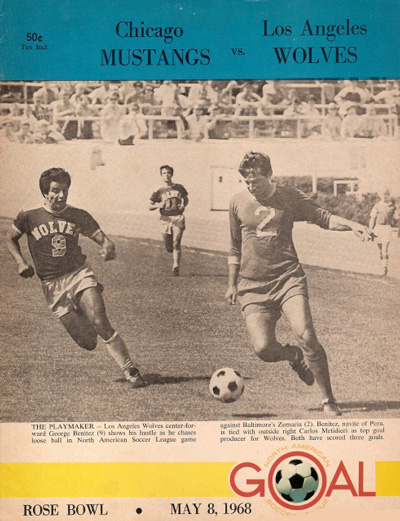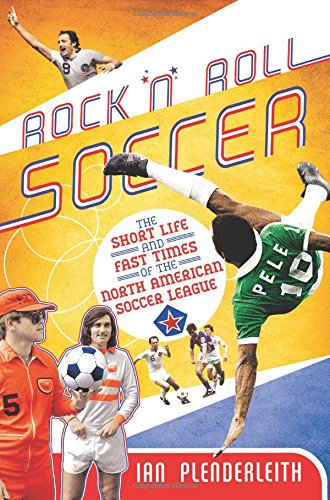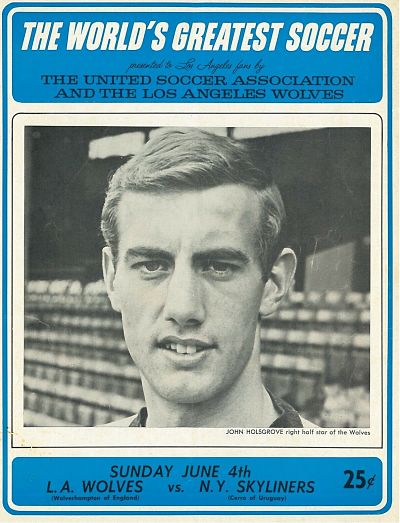United Soccer Association (1967)
North American Soccer League (1968)
Tombstone
Born: 1967 – USA founding franchise
Folded: Postseason 1968
First Game: May 27, 1967 (T 1-1 @ Houston Stars)
Last Game: September 7, 1968 (L 4-1 @ San Diego Toros)
USA Champions: 1967
NASL Championships: None
Stadia
1967: Los Angeles Memorial Coliseum
Opened: 1923
1968: The Rose Bowl (100,423)
Opened: 1922
Marketing
Team Colors: Forum Blue & Gold
Ownership
Owner: Jack Kent Cooke
Editor's Pick
Rock n' Roll Soccer
The Short Life and Fast Times of the North American Soccer League
by Ian Plenderleith
The North American Soccer League – at its peak in the late 1970s – presented soccer as performance, played by men with a bent for flair, hair and glamour. More than just Pelé and the New York Cosmos, it lured the biggest names of the world game like Johan Cruyff, Franz Beckenbauer, Eusebio, Gerd Müller and George Best to play the sport as it was meant to be played-without inhibition, to please the fans.
The first complete look at the ambitious, star-studded NASL, Rock ‘n’ Roll Soccer reveals how this precursor to modern soccer laid the foundations for the sport’s tremendous popularity in America today.
When you make a purchase through an affiliate link like this one, Fun While It Lasted earns a commission at no additional cost to you. Thanks for your support!
Background
The Los Angeles Wolves were a pro soccer club founded by Los Angeles Lakers and Los Angeles Kings owner Jack Kent Cooke. The Wolves were one of twelve original members of the United Soccer Association (USA) in 1967. The USA planned to launch in 1968, but accelerated its timetable when a rival league, the National Professional Soccer League (NPSL), announced plans to start play in 1967. The NPSL also had an L.A. franchise, the Los Angeles Toros.
Cooke originally planned to call his club the “Los Angeles Zorros”. But due to the USA’s scramble to launch in 1967, the league imported entire European and South American clubs to stock the rosters of its twelve franchises. Wolverhampton Wanderers of England signed on play for Cooke in Los Angeles. Wolverhampton was colloquially known as the “Wolves” so Cooke dropped the Zorros moniker in favor of Wolves shortly began the USA began play in the spring of 1967.
The Wolves topped the USA’s Western Conference with a 5-5-2 record. On July 14th, 1967, the Wolves hosted the Washington Whips in the United Soccer Association championship game at Memorial Coliseum. A crowd of 17,824 watched the Wolves best the Whips 6-5 in sudden death overtime.
1968: Formation of the NASL
After the 1967 season, the USA merged with the rival NPSL to form the North American Soccer League (NASL). Jack Kent Cooke’s Wolves retained the Los Angeles market while their erstwhile rivals, the Toros, moved south to San Diego.
The NASL abandoned the imported team strategy, so the 1968 Wolves featured an entirely new roster and coaching staff from the previous year’s champs. The club also left the Memorial Coliseum for a new home at the Rose Bowl in Pasadena. The re-booted Wolves dropped to 11-13-8 and failed to make the playoffs.
The Wolves folded following the 1968 season. Pro soccer returned to Los Angeles six years later with the formation of the NASL’s Los Angeles Aztecs in 1974.
Los Angeles Wolves Shop
[auction-nudge tool=”listings”]
In Memoriam
Wolves founder Jack Kent Cooke died of cardiac arrest on April 6, 1997 at the age of 84. New York Times obituary.
1967 Wolves Manager Ronnie Allen passed away on June 9, 2001. He was 72.
Downloads
6-12-1968 Wolves to Face Toronto Falcons at Rose Bowl Press Release
6-12-1968 - Wolves to Face Falcons at Rose Bowl Press Release
Links
United Soccer Association Programs
##



